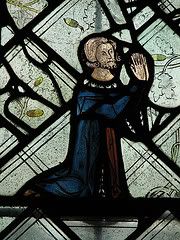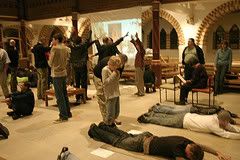Alright, so the bible talks all about worship right? The word shows up hundreds of times. What did it mean to the apostles and patriarchs? This is a quick word study done using the Strongs concordance and KJV bible. I’m sure an exhaustive study would be beneficial, but I write these posts on my lunch break and only have about 45 minutes. I think I have enough to go off of. I was surprised by what I found.
Let’s start with the OT:
Abraham worshipping with Isaiac on Mt. Horeb (Gen 22:5)
“Thou shalt worship no other God, for the Lord thy God is a Jealous God…” (Ex 34:14)
“All the earth shall worship thee, and shall sing unto thee; they shall sing to thy name.” (Psalm 66:4)
Virtually every time it appears, it is the Hebrew word Shachah – to bow down or prostrate oneself.
It’s used 100 times as “worship” and ~50 times as bow or stoop.

There is no idea of paying homage to deiety, singing songs, doing something ceremonial or ANY of the other activities we typically associate with worship. It is literally physically bowing down. Now bowing down probably implies that other things are going on (in the heart), or that other things may be going on around you. But the word means to get on your knees or face. That’s it.
The book of Daniel was originally in Aramaic, not Hebrew, so we get a little bit different word there:
“Thou, O king, hast made a decree, that every man that shall hear the sound of the cornet, flute, harp, sackbut, psaltery, and dulcimer, and all kinds of musick, shall fall down and worship the golden image” (Daniel 3:10)
The word is C@gid – to prostrate oneself, do homage, worship.
Used 12 times as worship
There it is again. To bow down. Worshipping Nebuchadnezzar’s golden statue consisted entirely of physically bowing down in front of or toward it. Shadrack, Meshach, and Abednego just had to stay standing up to get the death sentence.
Alright, what does the New Testament have to say?
I was surprised to discover that the word worship doesn’t actually show up very much in the NT at all.
Here are some examples:
“We have seen his star in the east and have come to worship him…” – Says the wise men in Matthew 2:2.
And now for the most quoted verse on worship in the whole Bible:
“God is a Spirit: and they that worship him must worship him in spirit and in truth.” John 4:24There is also magnificent imagery of worship in heaven:
“The four and twenty elders fall down before him that sat on the throne, and worship him that liveth for ever and ever, and cast their crowns before the throne, saying, holy, holy…” – Revelation 4:10
All of these are instances of the Greek word Proskuneo. Used 60 times, it means:
to kiss the hand to (towards) one, in token of reverence,
among the Orientals, esp. the Persians, to fall upon the knees and touch the ground with the forehead as an expression of profound reverence,
in the NT by kneeling or prostration to do homage (to one) or make obeisance, whether in order to express respect or to make supplication
So it’s definitely more defined in the NT. Other physical actions such as kissing the hand could be described. My guess is that this is a cultural difference. Maybe more southern-Europe than middle-east. Also, the idea that you are doing it to pay homage or show reverence IS wrapped into the definition this time. It’s not JUST bowing, as if you may be just tying your shoe.
Another word for worship, used only 6 times is the Greek Sebomai meaning to revere, to worship.
This time, no physical action is being described.
“But in vain they do worship me, teaching for doctrines the commandments of men.” (Matt 15:9)
And finally, Paul uses the Greek word Latreuo in about 3 places where it gets translated to mean worship in English. Most of the time, the word gets translated as “service”. This one is by far the most descriptive and the closest to what we think of as religious worship or litergy. Example:
For we are the circumcision, which worship God in the spirit, and rejoice in Christ Jesus, and have no confidence in the flesh. (Philipians 3:3)
The definition is:
1. to serve, minister to, either to the gods or men and used alike of slaves and freemen
2. in the NT, to render religious service or homage, to worship
3. to perform sacred services, to offer gifts, to worship God in the observance of the rites instituted for his worship
4. of priests, to officiate, to discharge the sacred office
I think this word must have been used (not in the Bible) to talk about worshipping other gods. It’s the OT that has all the complicated temple rituals, sacrifices, offerings and rites. The NT doesn’t have any priests. There are rites such as Baptism and the Lord’s Supper that I guess could be included in here.
My conclusion? I’ve been to a lot of churches that claim their worship is “biblical”. OK, so maybe what they are doing is. That’s great. One thing I take away from this word study though is this: If you’re worship doesn’t SOMEHOW include physically bowing down, then I don’t think you can argue that it’s all that “biblical”.
The high church liturgies often involve kneeling down during certain prayers, etc. Cool. Pentecostals often kneel down and even lay on their faces. Maybe that doesn’t float your boat, but there is a TON of biblical support (in both the old and new testaments) for doing just that! I grew up in a Baptist church and had never bowed or knelt in worship until I came to college and saw other people doing it at a charismatic gathering.

I’m curious of how the word worship has evolved over the years from meaning ONLY bowing down to the fairly broad concept where bowing down is an optional activity that comes several bullet points after “singing”. I think the word “praise” (which I’ve completely skipped over up until this point) must be wrapped up in all of this too.
Conclusion for today: Bowing down before God is a physical action we can do that is most certainly worship to him. Let’s do it, eh?
